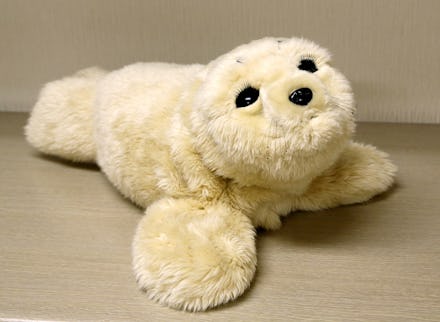Could this furry robot seal save us from our loneliness?

As the nation enters the fourth month of the COVID-19 pandemic, many of us are starting to get pretty lonely. The hugs that got us through hard times in the past have been cancelled due to social distancing. These distancing practices are crucial to public health, but they are also draining on our emotional health. As some scientists scramble towards a vaccine, others are trying to figure out how we can stay sane until we have one. These furry social robots may help ease some of our pandemic pain.
The robot, called PARO, is a plush stuffed seal robot that moves and makes objectively adorable cooing sounds in response to touch and sound. (Sidenote: PARO is the robot’s legal name, but no one needs to be yelled at right now, so henceforth I will refer to it as Paro.) Paro is not exactly new — it has been used to help elderly patients, especially those with neurodegenerative conditions, reduce stress since 2003 — but a small new study released last week suggests that it may also help younger people who need some physical contact. The study, published in the journal Scientific Reports, introduced 63 20-somethings to Paro for an hour-long session. Twenty additional participants did not get to play with Paro and were used as a control group.
The researchers were investigating what effect a session with Paro would have on the mood and pain levels of participants, and their results are heartening. Participants who interacted with Paro reported an elevation in mood and a decrease in perceived pain that the control group did now, EurekAlert reported. Researchers think that Paro might be able to help all people — not just our elder friends — deal with isolation. "These findings offer new strategies for pain management and for improving well-being, which are particularly needed at this time, when social distancing is a crucial factor in public health," Levy-Tzedek, lead author on the study, told EurekAlert.
But what I feel like I need right now is a little less technology and a little more connection, so the idea of snuggling with a machine isn’t really that appealing. I asked psychologists if they think Paro could actually help interaction starved humans feel better right now. “Touch, physical contact, a sense of connection and attachment, is quite literally necessary for life,” Stefani Goerlich, a Detroit-based psychotherapist, tells Mic. “Today, we live in an age where distance is the norm.”
“That’s all fine and good when you’re able to travel by choice, to go to the bar, to socialize with family,” Goerlich continues, “But for folks who are limited in this respect, due to distance or disability, a robot companion can be a lovely middle ground.” I often say that I hope for a future with fewer screens and more robots. This is not exactly what I had in mind, but right now, I would not say no to a chirping robot companion.
Goerlich also noted that while robots like Paro can be helpful, we shouldn’t rely on them to replace human connection entirely. “Science shows that we will take artificial comfort over nothing at all,” Goerlich says and then adds, “Should robot companionship become the new norm? No.”